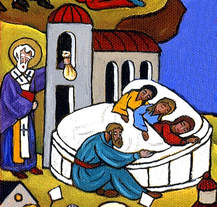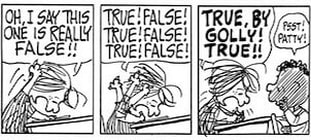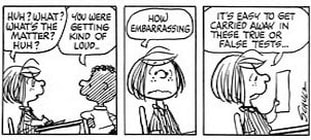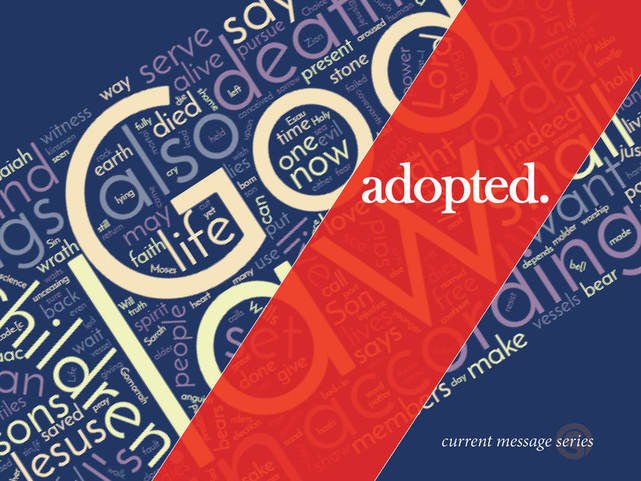|
Example certainly helps. When you see grateful kids, you’ll find grateful parents, teachers, and coaches. Really seeing the needy can help. Reflection can help. A person on the edge of despair may come to treasure quite ordinary things. (Academics and Dogbert call this “cognitive dissonance”. ) That allowed, gratitude often arises from disasters that disabuse people of the illusion that they deserve that pumpkin pie. Abraham Lincoln proclaimed America's national day of Thanksgiving in 1863, in the midst of bloody civil war. Martin Rinkart wrote the song, "Now Thank We All Our God," following the horror of the Thirty Years War during which he conducted about 4,480 funerals in his town. So how does gratitude arise in the needy, in the disappointed, in the cynical? Christians account for such a flower rising from such a desert as a work of God’s Holy Spirit. Encouragement helps gratitude grow. Following are some tunes that I've found to goose my gratitude.
0 Comments
Generosity is not a matter of magnitude but of proportion. Jesus looked up and saw the rich putting their gifts into the offering box, and he saw a poor widow put in two small copper coins. And he said, “Truly, I tell you, this poor widow has put in more than all of them. For they all contributed out of their abundance, but she out of her poverty put in all she had to live on.”* I knew that poor widow. Her name was Mrs. Thurston. You may have known her by other names. Mrs. Thurston was a tiny, serene person. As I pondered on Planned Poverty. I recalled her example of all that leads to generosity. Then I remembered one fellow had already told her story quite well. All I will add is that when I met her eighteen years after Dr. Kingsley did, Mrs. Thurston still presented Sunday School and "raw rubber chicken". Remembering Mrs. Thurston By Gordon Kingsley, President, William Jewell College Mrs. Hollis H. Thurston. We called her – well, we called her “Mrs. Thurston.” I guess this widow-woman had her very own first name, but I never knew it. She was, they all said, a good Christian woman. But that phrase does not begin to capture for me the Godliness in her fact and eyes and demeanor and manner of life. To me she was a Jesus come to earth in the frail body of a woman who was seventy, or ninety, or maybe a thousand years old. I was her pastor, but there was no question about which of us was the Christian…. It was at Bethlehem Baptist Church, out from Columbia…. Bethlehem has a great history: she celebrated her 150th anniversary just two days ago…. By the time I got there, though, in 1955, lots of folks had moved away from the countryside into the towns and cities, and Bethlehem had a small congregation—twenty-one persons or so on a good Sunday, and that counted dear old Jess Trimble who went to sleep during every sermon I ever preached, sitting comfortably in winter near the old stove that kept us all sort of warm. I finally got up courage to ask Jess why he went to sleep during my sermons, and he told me, “Gordon, I got a lot of confidence in you, and I need the rest.” So twenty persons and Jess were there on a good Sunday. But still the witness was there, on that old Boone County hilltop, and Mrs. Thurston and the Burks and the Hills and a few others were determined to keep it there. And all of us relied on, counted on, depended on, Mrs. Thurston. She would drive her old Ford car to church over rutted gravel roads, … her little white head hunched and peering through the steering wheel…. She taught a Sunday school class for years—at the back of the church, on the left side, last three pews. And she kept the church minute book in an immaculate hand, preserving records which go all the way back in a complete set to 1835; she was proud of those records, and she saw that the originals were protected in the Missouri Baptist Historical Collection at William Jewell…. She had made a list of all the pastors who had ever served the church, all the way back to 1835, and she had it on the wall at the front of the church…. And she hosted the preachers, giving me a stark, austere little room in her stark, austere old farm house on many a Sunday afternoon between morning service and night service…. Not that she was perfect. She had her faults. She was, for example, the worst cook I ever knew, and when she served a meal prepared, sort of, on her old wood stove, you knew it was going to be horrible. It was always chicken—all of us preacher boys always asked each other, “what did you have for chicken yesterday.” But Mrs. Thurston served rubber chicken—raw rubber chicken, seasoned with motor oil and pond scum. It was awful. Yet how I love her memory…. How many country churches accept joyfully the ministry of making preachers out of the wretched raw materials that come to them in the form of us preacher boys—bad as Mrs. Thurston’s chicken, we were—and what a beautiful ministry it is. Once Mrs. Thurston helped a preacher boy stay in school—maybe more than once she did that; I suspect so—by paying $100 on his tuition…. Mrs. Thurston found out about it somehow, and somehow came up with the money, as a gift, which no one was to know about. I of course was the preacher boy…. How many Mrs. Thurstons are there.... They are, just as Jesus meant it, “the salt of the earth.” They are also, just as Jesus meant it, “the light of the world.” They are God’s good and faithful servants. They are here, among us, everywhere. Presented at the Missouri Baptist Convention, Oct 28-30, 1985, (page 90)  Bethlehem Baptist Church, formerly near Harrisburg, MO. - Relocated to Boonville  Mrs. Thurston looked like Granny of The Beverly Hillbillies but was a quite different spirit. Granny scowled. Mrs. Thurston smiled shyly. Granny sported a gun. Mrs. Thurston carried a Bible--and she knew how to use it. Granny was feisty. Mrs. Thurston was faithful. Has a Mrs. Thurston blessed your life? There exist people who plan for you to be poor. However, involuntary poverty is not the subject of my rambling today. Rather, I will talk about my insane intention to earn what money I can but give it to the needy rather than to the greedy. Perhaps you continue reading due to morbid curiosity, to cite me as a cautionary example to your children. Please realize that there exist many like me who plan their own poverty. We are unseen and unheard, for we live under directives to not brag, to not even dwell on our own giving. “When you give to the needy, do not let your left hand know what your right hand is doing.” This stealth principle opposes giving to impress people, to earn points with God, or compensate for guilt. We begin from gratitude, looking back to what God has already given: "Freely you have received, freely give." We live in alert compassion: "I may give away everything I have,... but I gain nothing if I do not have love." We look forward with trust that, “God will supply all your needs.” With these attitudes and a live example or two, generosity naturally flourishes. That is why “God loves a cheerful giver," for that giver "is like a tree planted by a river, producing fruit in season, and its leaves don’t die."  By planned poverty, I do not mean throwing money out the window, but investing prayerfully, wisely, and generously in other people. Like Saint Nicholas, we throw money in through a window, to where it will do good. Generosity without wisdom can harm more than help, so I consider what needy persons really need--or trust them to decide better than I would. I adjust priorities. I avoid teaching helplessness. “If anyone is not willing to work, let him not eat,” sometimes applies, but not to the addled, the incapacitated, and four-year-olds. Indeed, by planned poverty, I mean budgeting both money and time to keep your family healthy and enlightened while as much as possible doing that for other families. “Live simply, that others may simply live.” Jesus slammed people who shorted their families: “Moses said, ‘Honor your father and your mother,’ … But you say a person can tell his father or mother, ‘I have something I could use to help you, but it is a gift to God.’ … You are rejecting what God said.” Planned poverty is a skill I continue to learn. Helping my effort, the people who are called into God’s kingdom function a little like a mutual funds broker, expertly redistributing gifts into a diversified portfolio of benevolence. But these people are more like a school for gaining smart compassion and encouraging intelligent trust. It’s no surprise that generosity emerges when you first give yourself. Footnotes: I am indebted to Roy Weece for the term "Planned Poverty", an idea he taught and lived. Like many skills, Planned Poverty improves not just with pondering and practice, but also with examples and mentoring. One such example is sketched in the follow-up post, "Remembering Mrs. Thurston". Music is the background of our lives... concerts, commuting, blaring through wireless headphones or an NPR tiny desk session, our days are rarely silent. Never before has music been so accessible, inexpensive or pervasive than it is today. It impacts us more than we realize
That's part of the reason why we often do a song from the radio in The Surge weekly services. We have a focused service, centered around a theme.... and the idea is the "special" will ask the question, that hopefully, the message will thoughtfully and biblically address. So, for the topic at hand, we'll do a song from the radio, or popular culture that is related. That will be good, or bad, or insightful, or alarming, sometimes ringing with wisdom and sometimes, ringing with the power of a negative example. This is a risk, but one we believe has such a strong upside, that it's worth doing, Here are a few of the pros and cons: The Good: - It strikes a familiar note with people who may have been unchurched previously - Good or bad, it is a voice in culture commenting on the topic at hand - It is often unexpected and helps break down barriers and pre-conceptions about the church - It can be a lot of fun - It stretches the band, making them better and engages them in interesting ways musically - It sets the stage for the gospel to speak in the context of our culture in a relevant way - People who don't do church, are often intrigued by this exercise - and it becomes a conversation that has a lot of healthy potential The Bad (or potential bad): - If the band doesn't pull it off, it can be a negative - Sometimes the message will be disturbing enough to cause signiicant worry or concern - It can be perceived as an endorsement, or worse, a celebration of a view that is potentially dangerous - It takes a significant amount of prep and energy, personally and in band rehearsal For us, for now, the good greatly outweighs the bad. It provides a connection point and a way to resonate with real people in a real way that is imminently healthy. Our commitment is to the truth and our primary expression of that truth is a close look at Scripture and trying to find the mind of God in the context of practical relationship. Music can help that cause. Adopted Five
Nov 5th, 2017 E Reiss Romans 7:1-6 Or do you not know, brothers—for I am speaking to those who know the law—that the law is binding on a person only as long as he lives? For a married woman is bound by law to her husband while he lives, but if her husband dies she is released from the law of marriage. Accordingly, she will be called an adulteress if she lives with another man while her husband is alive. But if her husband dies, she is free from that law, and if she marries another man she is not an adulteress. Likewise, my brothers, you also have died to the law through the body of Christ, so that you may belong to another, to him who has been raised from the dead, in order that we may bear fruit for God. For while we were living in the flesh, our sinful passions, aroused by the law, were at work in our members to bear fruit for death. But now we are released from the law, having died to that which held us captive, so that we serve in the new way of the Spirit and not in the old way of the written code. The Bad Marriage. As a Christian we pay attention to the law… it’s good advice and Paul isn’t saying, “look - the law won’t get you there, so dump the law.” No. In fully stepping into God’s heart for us, we have to break free of the law, without throwing the law away, or turning our back on the law. We have to escape in a way that is, in itself, lawful. Christ, in His death and resurrection, made a way for us to do exactly that. And as we come into that amazing change, we realize that we must not be married to the law. The law is a terrible husband! He’s a dogmatic bureaucrat with a ledger, making a solemn mark every time you think, say, or do something less than perfect. If we’re married to the law, we get our sense of self from performance. We’re trying to prove ourselves to God, to ourselves, and to other people through performance - look at my adherence to the moral law! The worst part is this: even if you win the game of “moral programming”, you still lose. You turn into something of a Pharisee, when you start comparing yourself to other people and think, “wow they are just terrible… I’m so much better than they are.” This is a condition we can’t adjust. We can't self-improve it. And we can’t divorce the law and be in the place God wants us to be. The only way out is death. And this is why the gospel is such good news! The Good Marriage. Because of what Jesus did… fulfilling the law and dying Himself, and joining us to His death… He sets us free from old marriage to the law through the mechanism of death. It is finished! So now that we’re free, we can enter into a new marriage, one filled with grace and love and great things for life. Two things in particular help us here: 1) Selflessness and 2) Encouragement. Selflessness We think that marriage is about me and getting my needs met and finding someone to help me navigate my life and my laundry. We think it is about someone helping buy a house for me to live in… but actually marriage is a master class on being less selfish. The people who get that do very, very well. The people who don’t, will struggle. Eph 6 - lays it out and it’s not about you, it’s about your mate. Wives, look to your husband. Husband, set aside your stuff and focus on words, actions, a lifestyle that will make your wife’s day better. This works for finances, and big decisions, and physical intimacy. When both people do this, it’s amazing. Your heart is full and your needs are met and this selfless attitude towards each other just kills conflict. God loves us just this way! Philippians says that He emptied Himself, taking the form of a servant - who was He serving? Us! He didn’t demand His rights, or His due, but instead laid out everything to help us. He is so Selfless in His heart towards us. In that light it’s easy for us to respond in gratitude and be less selfish ourselves. It’s not a thing to be generous to the poor in the light of the cross and Jesus giving His whole life away. Encouragement Another thing marriage brings to us is the opportunity for real encouragement. The whole world can be down on us, but if our partner loves us, they become a real haven. Their words and heart for us matter more than the opinion of strangers. In that light, hear what your new Husband says about you… and tune out the unhealthy and destructive words of the enemy. We need to let God speak over us in encouraging ways and celebrate our new identity in Him! You are a Child of God John 1:12 God loves you with an everlasting love Jeremiah 31:3 You are the apple of His eye – Zechariah 2:8 You are a friend of God John 15:15 You are blessed, chosen, called to declare His praise! Ephesians 1 and 1 Peter 2 You are not an accident, you are fearfully and wonderfully made Psalm 139 You are filled with new life in Christ: Colossians 3:3, NLT You are redeemed, forgiven and set aside for amazing work Isaiah 1 and Ephesians 1 You are free from the law of sin and death Romans! He gives you the power to act justly and to love mercy and to walk humbly Micah 6 The weight of marriage in impacting our self-image is an amazing power. And it sets us free to do amazing things… that go even beyond what the law would require. What looks like extreme generosity or sacrifice from the outside - is a natural and normal response to God’s love in our hearts! One morning last week several of us at my office sat around a table in a conference call. The lady to my left whispered to our colleague across the table.  "Your coffee mug says, "I AM GOD". What do you mean?" Sure enough, the mug displayed "I AM GOD". Beneath that claim was an owl with its eyes closed and some flowers. What the...? The mild-mannered owner squinted at his cryptic mug. He turned it around in his hands. Thus we all discovered that encircling the mug as a one-line border was a quote from Psalm 46 verse 10: BE STILL AND KNOW THAT I AM GOD I mumbled lamely, "In context, that verse is directed to Israel's enemies." Yep, I'm always ready to share the good news. Such personal mugs, pens, and knick-knacks announce Christians in the workplace. Sometimes I recognize Christian radio leaking from headphones. As best I can tell, an overt Jesus fish at the desk mainly results in Christians chatting about church activities or tickets for the Hillsong concert. The Twelve Apostles Calendar does not stimulate connection with non-believers. Thus my own approach to identifying with Christ tends toward the organic: consistently seeking the success of my co-workers, clients, and company; not cursing, going the second mile; asking for insights about TV or movies that I don't follow. "By this shall all people know you are my disciples, that you love one another." For some non-believers, a sunny "This is a Day the Lord has Made" plaque may be viewed not as an invitation but as a warning! It marks your desk area as a no-cussin' zone. Even my low-key approach still results in me being treated as a delicate flower, or as God's spy, or as God's bully. Thus, a guy at a previous job vented to me that, "religious people are judgmental. They hate gays and basically everyone." I timidly inquired, "Do you think I'm judgmental?" He reflected and replied, "Well, maybe not you. But, ha, I don't know you that well." I offered, "So you wouldn't know that the local LGBT community had me offer the prayer at their Thanksgiving dinner?" Surprised pause: "Oh! They did? You're not gay, are you?" "They did, I'm not, and you're right." I persisted. "There's a long history of church people being ignorant, snooty, and murderous. I think you know that's the opposite of what Jesus said: 'Judge not,' and 'Judge with right judgement,' and, 'Love your neighbor as yourself.'" I didn't let go: "I think judgmentalism is a disease infecting everyone. You yourself want to be fair, but just now you put all 'religious people' in the same judgmental bag." "Oh. I did," he conceded. "My mistake." "No problem," I shrugged. "You're still right. I am often judgmental in my head for a while, even if I stop my mouth in time." Animals judge. You and I judge. I did unnecessarily judge people several times today, when I should have deferred judgement or skipped evaluation altogether. So I need to remember--I need people to call me down when they catch me judging--I am not God.
Message Summary
Week of 29 October 2017 Adopted, part 4 (Romans) Romans 6:15-23 - What then? Are we to sin because we are not under law but under grace? By no means! Do you not know that if you present yourselves to anyone as obedient slaves, you are slaves of the one whom you obey, either of sin, which leads to death, or of obedience, which leads to righteousness? But thanks be to God, that you who were once slaves of sin have become obedient from the heart to the standard of teaching to which you were committed, and, having been set free from sin, have become slaves of righteousness. I am speaking in human terms, because of your natural limitations. For just as you once presented your members as slaves to impurity and to lawlessness leading to more lawlessness, so now present your members as slaves to righteousness leading to sanctification. For when you were slaves of sin, you were free in regard to righteousness. But what fruit were you getting at that time from the things of which you are now ashamed? For the end of those things is death. But now that you have been set free from sin and have become slaves of God, the fruit you get leads to sanctification and its end, eternal life. For the wages of sin is death, but the free gift of God is eternal life in Christ Jesus our Lord. Grasping the key point of any particular text in Romans requires, perhaps more so than most other books of the bible, the context of what’s just been said. As we’ve noted, Paul has built a case that everyone everywhere needs saving because of sin and that no one anywhere can achieve getting saved on their own because they have already sinned (chapters 1-3). He shows that what we could not do, God has done through his Son, Jesus Christ (chapters 3-4). He builds on this argument (chapter 5) that since this salvation thing is a work of God, not us, once we are truly saved, God will not, cannot, change His mind about that. Well, that argument led critics to proclaim that such a belief would propel Christians to sin all over the place. And that prompted Paul to delve into the whole concept of just what has happened to an individual who has been saved (chapters 6-8). And so far in chapter 6, we find that what has happened is as dramatic as a caterpillar going into a cocoon and emerging a butterfly. We’ve been changed from the inside out. Everything about us is altered. Our old self is dead, and we’ve been made new, or in Paul’s terminology, spiritually raised from the dead. We are to reckon ourselves as dead to sin and alive to God in Christ. In fact, since all our sins are covered, the Christian is not even under the law anymore, but under grace. That gets us to our text today. Paul no doubt has heard the charge that Christians, or frankly anyone, who believes they are not answerable to the law will prove to be lawbreakers. Paul’s response is sort of a “Not so fast there, big guy! The Christian isn’t just a free-wheeling, whirling dervish ricocheting from sin to sin as he violates every law he can. What you have missed is that the Christian is still ‘under’ something. It’s just not the law anymore. It’s grace.” Paul then seeks to find an analogy that will bring this point home, and what he lands on is slavery. Not a bad idea, really, since slaves constituted about one-third of the population of Rome at this time. Probably half of the congregation in the church in Rome were either slaves right now or had been in the past. They would totally get what slavery means. Paul says, “Hey, think of it this way. Before you got saved, you were slaves of sin. The hallmark of slavery is that you must obey your master. You have no choice. If you don’t, that master can beat you senseless or worse. So, if you now are not under the master of sin, but the master of grace, you are required as a slave of grace to obey it.” Now, this sounds strange, perhaps, but remember that scripture tells us that at salvation the Christian is transferred from the kingdom of darkness and into the kingdom of God’s dear Son. We’ve moved from one king to another, one master to another. See, Bob Dylan was right. You gotta serve somebody. And we get to choose: sin and Satan, or righteousness and Christ. And those are the only two choices for everyone on earth. God is going to lead us to become the people he can use more and more through our obedience to Him through Christ. And that is what is going to prevent the Christian from sin. He’s answerable to another Master. In v19, Paul seems a little uncomfortable with this slavery example, as accurate as it is. It’s as if he wants to clarify things a bit. He wants us to compare the two slavery situations. For example, if you were a slave in Rome, you had to obey because of fear. You disobeyed, you rebelled, at your own peril, and you could expect the consequences to be severe. But is that the kind of Master Christ is? Yes, we are to fear God, in the sense of honoring and respecting him. But He considers us his children. He’s adopted us as sons and daughters. He loves us. That’s a different slave-master relationship, isn’t it? Paul distinguishes the two examples in v20-23. As a slave to sin, you got what benefits? Oh, shame and death. Hmmm. . .not that good a deal. But set from sin and given a new master, God Himself, what do you receive? Oh, I don’t have to sin anymore; I don’t have to deal with its consequences in my life; I get a changed life that makes me more and more useful to God and the things He has for me to do here in this life; and, wait, there’s more--there’s a whole life that never ends beyond this existence here. Sweeeeeet!! Paul’s point? A Christian freed from the master of sin and the law will not be a reckless sinner because He will obey his new master, Christ, who will lead him to live the life that Jesus promised his followers—a life to the full. And that is going to be too wonderful for anyone to want to go back and let sin be the boss. I think about the saddest people I know are those who have accepted Christ, but still try to dabble in the dark side with their pet sins. They never quite experience that life to the full. Instead, their heavenly Father has to deal with them as rebellious children through loving discipline. And they’ll go through life like the dog who refuses to obey his master’s voice and runs away every chance it gets. That dog will find it doesn’t get to run free and experience a life of true freedom under the master of grace. Instead, that dog will be leashed. The bottom line sounds a bit paradoxical: Obedience to the master of grace through Christ actually nets us the freedom to live the life we always really wanted. |
Our Writers:At The Surge we love doing things together... that includes writing a blog! Here are a few of our main contributing authors: Greg JohnsonJesus++ Dwaine DarrahOur fearless leader, Dwaine is the lead pastor at The Surge. His experience in counter terrorism with the CIA prepared him for ministry and he likes dogs and babies even more than E does. EE (short for Eric Reiss) is the Wingman at The Surge and likes dogs, music, Mexican food, his wife Karen and his little girl Evangeline... not necessarily in that order. Archives
June 2024
Categories
All
|
|
|
The Surge Community Church
Meeting Sunday Mornings at The State Theatre in Falls Church, 11:10am! Rebroadcast Available Sunday Evenings with SurgeOnDemand, 7:00pm! |








 RSS Feed
RSS Feed
